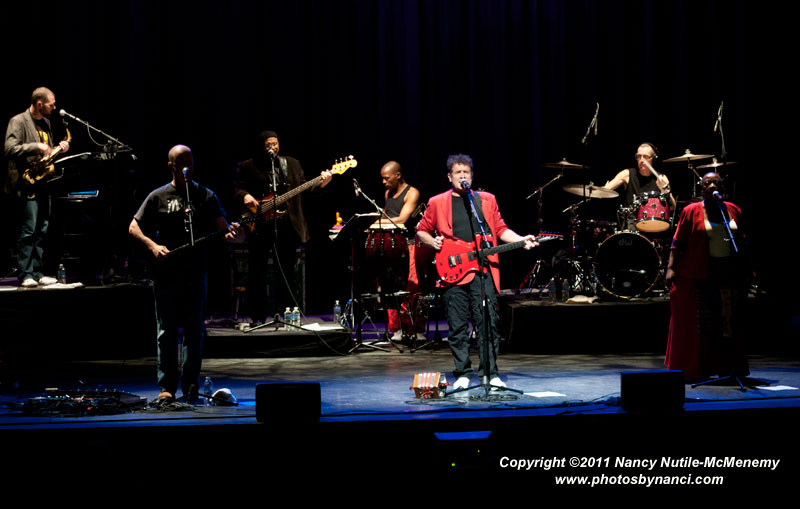
10.05.2011
• Home • Nach oben • Goodbye • Goodbye • fans goodbye... • MANDELA • Interviews1 • Interviews2 • Road Warriors • Jesse Clegg • Honorary Doctorate Citation for Johnny • Bühne frei für Johnny Clegg und Juluka! • Musik Südafrikas • Universal Men • The Zulu Factor • Reiseland Südafrika • WM-Ausrichter Südafrika • Zulu Little Fingers • Concord Nkabinde • scatterling shop • Scatterlings Newsletter • Johnny Clegg Visits Dartmouth 2011 • Johnny Clegg Visits Dartmouth •
http://www.dartmouth.edu/~envs/events/past/clegg2011.html
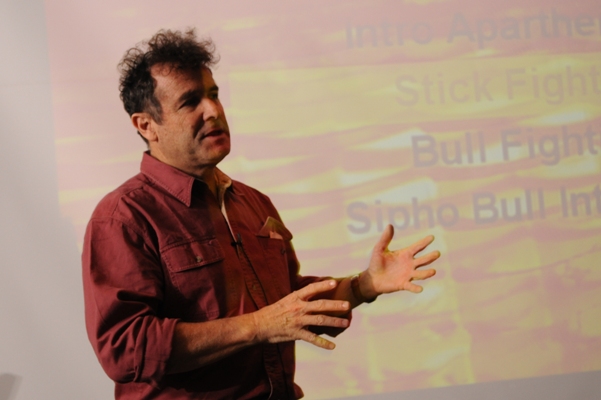
more photos by Jon G. Fox
http://www.dartmouth.edu/~envs/events/past/clegg2011.html
Visit with Students
South African musician, environmental and cultural activist, and anthropologist
Johnny Clegg took time out from his six week, 32-show tour of the U.S. and
Canada to speak with a group of students in a crowded Environmental Studies
Library in Fairchild on the afternoon of April 6th, 2011. This is the second
time that the Environmental Studies Program has brought Clegg to Dartmouth.
Clegg, who was born in England and lived in several African nations during his
childhood, spoke about his adopted homeland, the struggle to end apartheid, and
his musical influences.
Clegg told the group that South African politics have shaped the country’s
cultural development, including its music industry. During the late 1980s, most
American record labels divested of their assets in the country as part of
sanctions against the apartheid government. As a result, an entire generation
was cut off from foreign music, which encouraged home-grown artists. Today,
while events like the 2010 World Cup soccer tournament hosted in South Africa
have helped promote national unity, the country remains divided. This cultural
reality is manifest in South African music, where traditional Zulu musical
styles compete with more popular Kwaito rap for radio airtime.
Although Clegg has drawn heavily on Zulu music and dance – he is often called Le
Zoulou Blanc (“The White Zulu”) – he was philosophical about the process of
musical evolution, calling all musical styles “cannibalistic” and the tastes of
the listening public “cyclical.” When a student asked him for his thoughts on
Paul Simon’s foray into African music in the 1970s, Clegg stated that all music
shares the common traits of rhythm, melody, and lyrics, and any music that
evokes an emotional response from the listener is “valid.”
Clegg concluded his remarks with some advice for the future activists and
artists in the room, encouraging them always to keep a sense of humor in order
to prevent their issue-based art from becoming blatant propaganda. Drawing on
his experience campaigning for racial equality, environmental protection, and
HIV/AIDS awareness, Clegg argued that an effective activist engages in “conscription,”
recruiting the audience to his or her cause rather than making them feel guilty
for their faults.
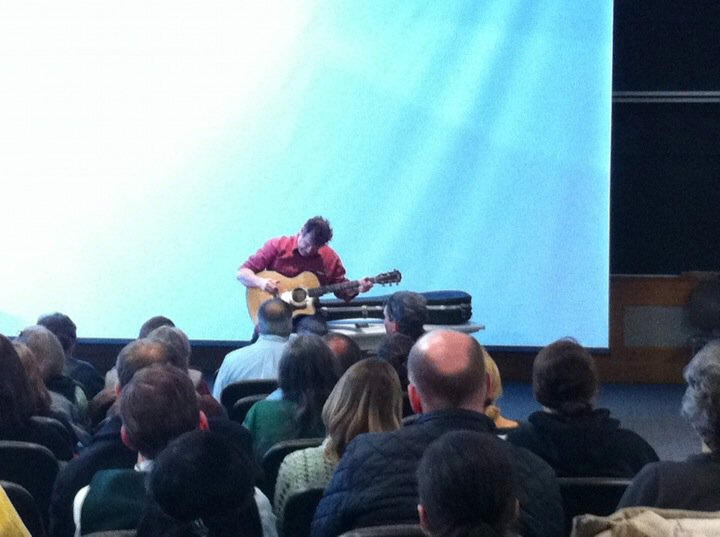
The George Link Jr. Environmental Awareness Lecture
Johnny Clegg spoke to about 175 students, faculty and community members in
Filene Auditorium on Wednesday, April 6, 2011. His talk centered on the
metaphors and symbols in relationships among people, domesticated animals, and
the natural world in South Africa. He then connected these cultural symbols to
concepts of masculinity, stick fighting, and sorcery which figure prominently in
traditional tribal societies. He also incorporated a multimedia aspect to his
talk with a few video clips, including an interview with Sipho Mchunu, Clegg’s
South African musical collaborator in the band Juluka. The symbol of the bull
was prominent in the talk, not simply as a powerful, masculine animal but as an
animal that guarantees the life and prosperity of family.
Clegg played one Zulu melody on acoustic guitar, demonstrating his inimitable
ability to switch from academic discourse to musical expression. The audience of
local residents, faculty, and undergraduate and graduate students appeared to
enjoy the diverse presentation. Without a formal performance scheduled, it was a
non-work day for the band, and most of them were in attendance, which we think
might have been the first time the band heard Johnny give an academic talk.
After answering a few questions, Clegg described the song “Digging
for Some Words” and its
connection to the theme of environmental change, including global climate change
today. Then he and fellow band members Mandisa Dlanga and Andy Innes performed
it, with Dlanga on vocals and Innes on acoustic guitar.
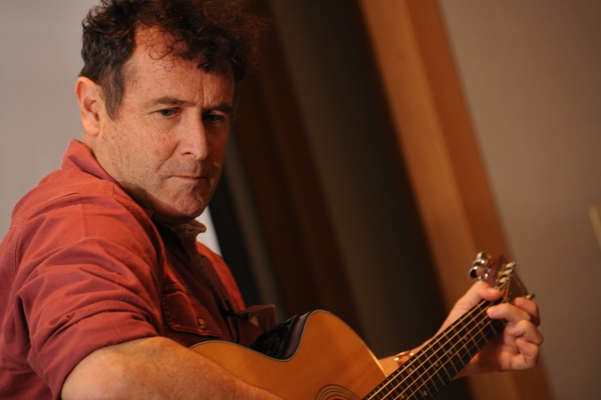
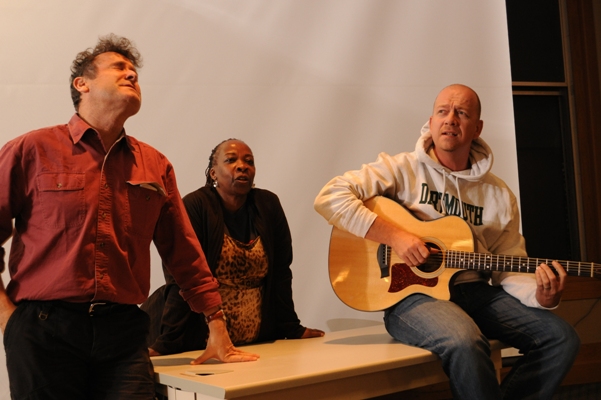
more photos by Jon G. Fox
http://www.dartmouth.edu/~envs/events/past/clegg2011.html
The Concert
The Johnny Clegg Band was in its element during a Thursday, April 7th, 2011
concert in front of an almost sold-out audience at the Lebanon Opera House.
Clegg, 57, brought a palpable energy to the two hour long show, constantly
dancing and moving on stage. He allowed for time in between songs to share
humorous and informative anecdotes from his 30+ year musical career. The band,
comprising some members like Andy Innes and Mandisa Dlanga, who have performed
with Clegg for decades, remained technically precise and rocked the intimate
venue. Impressive instrumental solos from Innes, as well as Dan Shout on alto
sax and Trevor Donjeany on bass reminded the audience that the band is not just
about its frontman, Clegg. The audience wasted little time in abandoning its
seats to dance in the aisles. After the concert, members of the band took the
time to sign CDs and meet a long line of fans.
Set list: Love in
the Time of Gaza, Africa,
Bullets for Bafazane, Giyani,
Asilazi, Tough Enough,
All I Got is You, Touch the
Sun, Give Me The Wonder,
I Call Your Name/Dance,
December African Rain, Impi,
Emalonjeni, Hidden Away Down,
Great Heart, Dance,
Scatterlings, Cruel Crazy
Beautiful World, Encore: Asimbonanga,
Dela
- YouTube Video - Johnny Clegg Band, Lebanon, NH 4/7/11
- YouTube Video - Dance
- Playlist and Johnny Clegg's Thank You to Dartmouth
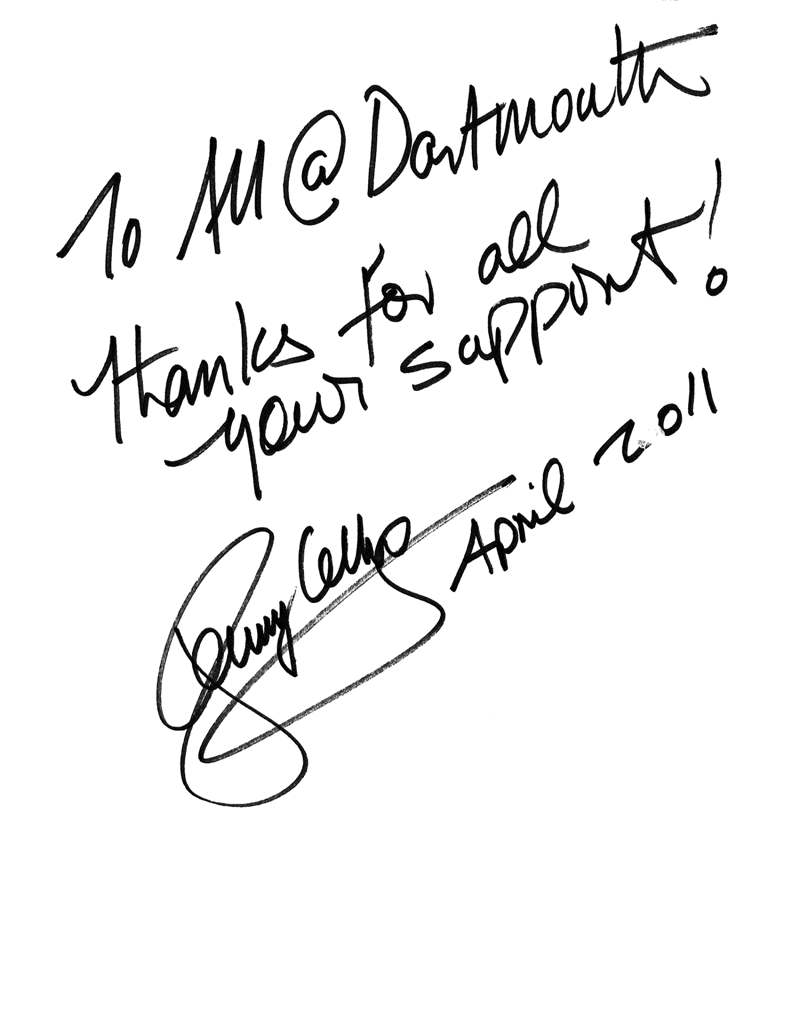
Authors: Matt Nichols, ’13, and Andy Friedland






